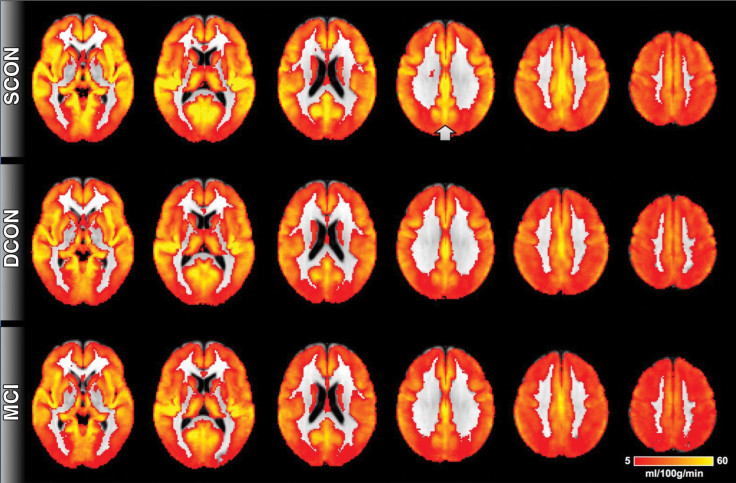From MCI To Dementia: Brain Scans Show Cognitive Decline Before Symptoms Appear

The slide from sound cognitive function to impaired cognitive function is a slow and gradual one. Illnesses like Alzheimer’s disease and dementia are so hard to prevent because scientists don’t have the tools to notice slight changes early on, but new research suggests MRI scans may offer a helping hand.
Alzheimer’s disease, the most common form of dementia, develops over time. It begins as mild cognitive impairment (MCI), which steadily worsens into general dementia, and eventually ends as full-blown illness. As imaging technologies advance, the blurry lines between these stages begin to come into focus, offering scientists a greater chance at catching, slowing, and perhaps even stopping illnesses altogether.
ASL, MCI, MRI
The brain region that most interests researchers is called the posterior cingulate cortex. It’s located in the middle of the brain and is responsible for coordinating a number of processes, such as your sense of awareness and episodic memory retrieval. When your grandmother recalls changing your diaper many years ago, for example, it’s her posterior cingulate cortex doing the work.
The area also acts as a hub, which means when it dies other processes may die with it. Prior research has already validated this hypothesis. A study conducted in 2010 found that when patients were put into an MRI scanner, the less blood that traveled through their brain tissue before dementia had set in — a process known as “perfusion” — the more likely patients were to become demented later.
“There is a known close link between neural activity and brain perfusion in the posterior cingulate cortex,” Dr. Sven Haller, author of the latest study from the University of Geneva, said in a statement. “Less perfusion indicates decreased neural activity.”
Haller and his colleagues wanted to test the MRI theory even further. They recruited 148 healthy elderly participants and 65 people with MCI, each undergoing a brain scan and neuropsychological assessment. Eighteen months later, the participants were brought back into the lab to assess their follow-up health. Of the 148, 75 remained healthy and 73 saw cognitive declines. Baseline comparisons showed subjects who had poorer perfusion rates were more likely to fall into the cognitive decline group.
This isn’t the first time scientists have shown a link between perfusion rates and MCI. However, it is one of the largest studies to find the link without radiation-based imaging techniques. The gold standard for brain metabolism imaging is positron emission tomography, more commonly known as a PET scan, which relies on feeding radiation into the patient’s brain to see which areas are underperforming.
But radiation at even a low dosage can be harmful. MRI relies only on high-powered magnets to form an image, and the specific kind of MRI used in the study, arterial spin labeling (ASL), which measures brain health via perfusion rather than injectable dyes, probes even deeper with minimal added cost.
“ASL MRI is simple to perform, doesn't require special equipment, and only adds a few minutes to the exam,” Haller said.
Feeling Fine, Don’t Panic
It’s important to keep in mind the study isn’t comprehensive. The posterior cingulate cortex plays an important part in predicting cognitive decline, but its deterioration doesn’t reflect the origin of disease. Most research, for instance, suggests Alzheimer’s begins in the medial temporal cortex, an inferior part of the brain also known for its role in storing memories.
On the other hand, the study isn’t necessarily meant for the general public, argues Dr. Michael Weiner, senior author of the 2010 study and co-lead investigator at Brain Health Registry. “The last thing society needs is a lot of normal, healthy people who feel fine visiting their doctors and saying, ‘I’m worried I’m going to get Alzheimer’s disease,’” he told Medical Daily.
Despite the leaps in understanding what causes Alzheimer’s disease — most evidence points to an overabundance of amyloid protein in the brain — treatment still doesn’t exist. And prevention is even harder, so the best advice people can get is to eat healthy and exercise. According to Weiner, mild cognitive decline doesn’t automatically signal traces of Alzheimer’s, and people shouldn’t fear what may not lie ahead.
“If somebody’s really concerned, they should go to their doctor. But if they’re feeling normal for their age, we don’t want people being studied widespread,” he said, “unless they get involved in a research project.”
Source: Xekardaki A, Rodriguez C, Montandon ML, et al. Arterial Spin Labeling May Contribute to the Prediction of Cognitive Deterioration in Healthy Elderly Individuals. Radiology. 2014.
Published by Medicaldaily.com



























